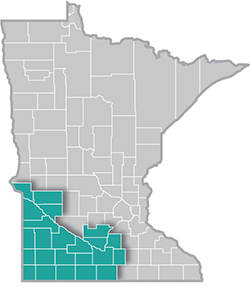 Southwest Minnesota is a national leader in agricultural production, and renewable energy.
Southwest Minnesota is a national leader in agricultural production, and renewable energy.
The region's thriving manufacturing sector includes food processing, machinery, printing, metal products, and computers and electronic products.
Want the freshest data delivered by email? Subscribe to our regional newsletters.
2/22/2024 9:00:00 AM
Luke Greiner, Amanda O'Connell
Striking a balance between passion and practicality is key when it comes to choosing a career. While finding fulfillment in your work is undoubtedly important, it's also perfectly valid to seek out a job that offers financial security and stability. So, if you're on the hunt for a high-paying career that aligns with your skills and interests, the question becomes: which positions should you prioritize? Join us as we navigate through the top 25 highest-paying jobs in Southwest Minnesota, shedding light on the lucrative opportunities that await in this region.
DEED's Occupational Employment & Wage Statistics program has data for about 500 occupations in Southwest Minnesota, ranging from Accountants to Woodworkers, and everything in between. The largest employing occupations in the region are Home Health and Personal Care Aides, with more than 6,100 workers, followed by Cashiers with just under 5,000 jobs, General & Operations Managers with just over 4,000 jobs, and Heavy & Tractor-Trailer Truck Drivers, which had around 4,000 jobs. On the other hand, 20 different occupations had an estimate of just 10 workers within the region, including Bicycle Repairers, Craft Artists, Private Detectives and Investigators, and Travel Agents.
| Table 1. Top 25 Highest Paying Occupations in Southwest Minnesota | |||||
|---|---|---|---|---|---|
| SOC Code | SOC Occupational Title | Estimated Regional Employment | Median Hourly Wage | Median Annual Wage | Typical Educational Requirement |
| 291249 | Surgeons, All Other | 60 | $200.44 | $416,905 | Advanced Degree |
| 291229 | Physicians, All Other | 160 | $155.45 | $323,334 | Advanced Degree |
| 291216 | General Internal Medicine Physicians | 70 | $151.28 | $314,656 | Advanced Degree |
| 291223 | Psychiatrists | 20 | $148.02 | $307,871 | Advanced Degree |
| 291241 | Ophthalmologists, Except Pediatric | 10 | $147.45 | $306,694 | Advanced Degree |
| 291215 | Family Medicine Physicians | 130 | $130.77 | $271,995 | Advanced Degree |
| 291151 | Nurse Anesthetists | 120 | $106.84 | $222,227 | Advanced Degree |
| 291221 | Pediatricians, General | 30 | $104.37 | $217,100 | Advanced Degree |
| 291021 | Dentists, General | 100 | $86.52 | $179,961 | Advanced Degree |
| 111011 | Chief Executives | 410 | $68.67 | $142,827 | Bachelor's Degree |
| 291041 | Optometrists | 50 | $68.66 | $142,812 | Advanced Degree |
| 291051 | Pharmacists | 320 | $68.08 | $141,614 | Advanced Degree |
| 191011 | Animal Scientists | 20 | $65.12 | $135,444 | Bachelor's Degree |
| 119041 | Architectural & Engineering Managers | 100 | $64.34 | $133,824 | Bachelor's Degree |
| 291171 | Nurse Practitioners | 250 | $63.98 | $133,076 | Advanced Degree |
| 291071 | Physician Assistants | 160 | $63.39 | $131,843 | Advanced Degree |
| 112022 | Sales Managers | 290 | $59.45 | $123,660 | Bachelor's Degree |
| 113021 | Computer & Information Systems Managers | 160 | $59.41 | $123,558 | Bachelor's Degree |
| 112021 | Marketing Managers | 170 | $58.62 | $121,931 | Bachelor's Degree |
| 518013 | Power Plant Operators | 50 | $53.30 | $110,883 | High School or Less |
| 119121 | Natural Sciences Managers | 10 | $52.44 | $109,078 | Bachelor's Degree |
| 419031 | Sales Engineers | 20 | $51.80 | $107,742 | Bachelor's Degree |
| 113031 | Financial Managers | 620 | $51.25 | $106,597 | Bachelor's Degree |
| 119199 | Managers, All Other | 140 | $50.98 | $106,043 | High School or Less |
| 331021 | First-Line Supervisors of Firefighting Workers | 10 | $50.79 | $105,637 | High School or Less |
| Source: DEED Occupational Employment & Wage Statistics | |||||
Not surprisingly, the highest paying jobs are concentrated in the Healthcare Practitioners field, led by Surgeons, Physicians, Psychiatrists, Nurse Anesthetists, and Pediatricians, which all earn more than $100 per hour in Southwest Minnesota. Nine of the top 10 and 13 of the top 25 highest paying occupations are healthcare practitioners and technical occupations, with all requiring an advanced degree.
The 10th highest paying occupation was Chief Executive Officers, which earned more than $140,000 per year at the median. Other management occupations that offered high wages in the region include Architectural & Engineering Managers, Sales Managers, Computer & Information Systems Managers, Marketing Managers, Natural Science Managers, and Human Resources Managers, which finished just outside the top 25. In general, these occupations tend to require a bachelor's degree.
Wages were also extremely high for three occupations that don't typically require a postsecondary degree, including Power Plant Operators, All Other Managers (i.e. Wind Energy Operations Managers, Compliance Managers, and Loss Prevention Managers), and First-Line Supervisors of Firefighting & Prevention Workers (see Table 1).
While important, wages are certainly not the only important aspect of career exploration. Students and jobseekers need to take into account several factors including:
By carefully considering these factors and conducting thorough research, students can make informed decisions when choosing a career path that aligns with their interests, goals, and aspirations. Visit our page to learn more about the many paths to career success in Southwest Minnesota.
Contact Luke Greiner at luke.greiner@state.mn.us or Amanda O'Connell at amanda.oconnell@state.mn.us.